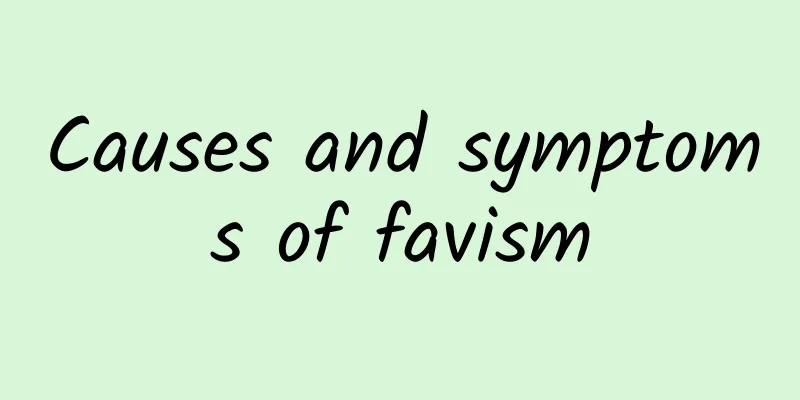Causes and symptoms of favism

|
What is the cause of favism and how to treat it? Today I will give you a detailed introduction: Causes of favism:Favism is a disease caused by glucose-6-phosphate dehydrogenase (G-6-PD) deficiency, characterized by sudden acute intravascular hemolysis after consuming fresh broad beans in the presence of hereditary glucose-6-phosphate dehydrogenase (G-6-PD) deficiency. People with genetic defects in red blood cell glucose-6-phosphate dehydrogenase (G6PD) will develop acute hemolytic anemia, called favism, after eating fresh broad beans or coming into contact with broad bean pollen. The pathogenic mechanism is not yet fully understood. It is known that sensitive red blood cells with genetic defects cannot provide enough NADPH to maintain the reducing property (antioxidant effect) of reduced glutathione (GSH) due to the defect of G6PD. When encountering certain factors in broad beans, the red blood cell membrane is oxidized and a hemolytic reaction occurs. G-6-PD has the function of protecting normal red blood cells from oxidative damage. Fresh broad beans are strong oxidants. When G-6-PD is deficient, red blood cells are damaged and cause disease. Symptoms and signs of favism:In the early stage, there are chills, mild fever, dizziness, fatigue, lack of appetite, and abdominal pain, followed by jaundice, anemia, hemoglobinuria, and soy sauce-colored urine. After that, the body temperature rises and fatigue worsens, which can last for about 3 days. At the same time as the hemolytic anemia appears, vomiting, diarrhea, and abdominal pain increase, the liver is enlarged, liver function is abnormal, and about 50% of patients have splenomegaly. In severe cases, coma, convulsions, and acute renal failure can be seen. If emergency treatment is not timely, death is often caused within 1 to 2 days. Most cases develop 1 to 2 days after eating broad beans. Early symptoms include anorexia, fatigue, low fever, nausea, and irregular abdominal pain. Then, due to hemolysis, the corners of the eyes become yellow and the whole body becomes jaundice, and soy sauce-colored urine and anemia symptoms appear. In severe cases, there are urine masses, shock, heart and kidney failure, and fixed deviation of both eyes can be seen in severe hypoxia. If not treated in time, the patient may die within one to two days. Therefore, patients with the above symptoms should be sent to the hospital for diagnosis and treatment immediately. What should be paid attention to before treatment of favism? Prevention: Experts say that you can avoid favism by not eating large amounts of broad beans continuously or all at once. However, people with hereditary red blood cell defects, hemorrhoidal bleeding, indigestion, chronic colitis, uremia, etc. should be careful not to eat broad beans. How to care for favism? Prohibited daily necessities Camphor, stink pills, wintergreen oil, pigments, Mentholatum peppermint cream, Wuwu cream, Pingan cream, traumatic injury wine with bezoar, blue mercury water, gentian violet (gentian violet), Zhuang Sheng's Cooling Bath (with honeysuckle), white flower oil, Wanjin Exercise well and enhance immunity. Let your baby drink more water, bask in the mild sunshine, breathe fresh air, and if conditions permit, take him to places like Aiyingfang to swim. Contraindications:Take the medicine under the guidance of a doctor. It is not advisable to take oxidizing drugs, such as primaquine, sulfonamides, furans, vitamins K3, K4, phenacetin, aminopyrine, sulfones and other drugs and Chinese medicine pearl powder, wintersweet flowers, Chuanlian, etc. The following drugs and foods are more likely to cause hemolysis and should be prohibited: Antimalarial drugs: primaquine, primalquine, pentaquine; Sulfonamides: sulfamethoxazole, sulfapyridine, p-aminobenzenesulfonamide, sulfacetamide; Antipyretic analgesic: acetanilide; Sulfones: Thiosulfone; Others: furantin, furazolidone, nitrofurazone, nalidixic acid, nitroimidazole, isopropylamine, naphthalene (camphor), methylene blue, phenylhydrazine, trinitrotoluene, Chuanlian, pearl powder, broad beans; Traditional Chinese medicine: mint, camphor, naphthol, Sichuan lotus, bezoar powder, wintersweet flower, bear bile, opening tea, Qilin powder, infant essence, bezoar detoxification pills, etc. |
>>: Symptoms of favism and how to treat favism
Recommend
What are the uses of aloe vera water?
Aloe vera water is a skin-friendly product that i...
How is A-bike? A-bike review and website information
What is A-bike? A-bike is a famous folding bike br...
The role and efficacy of purple onions Purple onions can prevent and fight cancer
Everyone must have eaten purple onions. They also...
Medicinal value and efficacy of figs
Fig is a deciduous tree that grows very tall and ...
What is the Pakistani government like? Pakistani government reviews and website information
What is the Pakistani government website? This web...
How to make tomato juice
We often use tomato juice when cooking, so let me...
How is Lillibet University College? Lillibet University College Reviews and Website Information
What is the website of Lillebaelt University Colle...
What is eHow? eHow review and website information
What is eHow? eHow is an online knowledge resource...
Who can't eat pickled ginger in vinegar? Taboos of eating pickled ginger in vinegar
Pickled ginger in vinegar is the most popular way...
Preparation and efficacy of osmanthus wine
Osmanthus wine is a special wine that many people...
How to rent a car in Alamo? Reviews and website information of Alamo car rental
What is Alamo Rent A Car? Alamo Rent A Car is an A...
How to eat Qingming vegetables? Common ways to eat Qingming vegetables
Qingming vegetable is a wild vegetable with high ...
How is St. John Fisher University? St. John Fisher University reviews and website information
What is St. John Fisher University? St. John Fishe...
The efficacy and function of wild leek
Wild leek is a wild herb. It looks similar to lee...
Lotus Chicken Congee
How much do you know about Furong Chicken Congee?...









